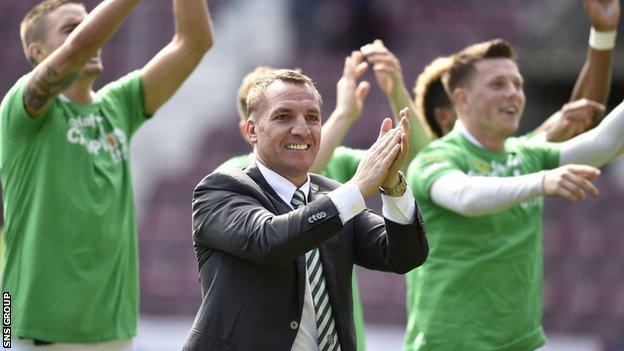Brendan Rodgers: How Celtic manager drives champions to relentless levels

Last updated on .From the section Football

In the beginning, people laughed, people mocked, people went on television and radio and on social media and had a hoot at Brendan Rodgers' expense.
Back in July, not that anybody is in any danger of forgetting, Celtic lost the first leg of a Champions League qualifier to Lincoln Red Imps, a team from Gibraltar that had in their ranks a labourer, a shipping agent, a customs officer, a civil servant, two policemen and just five professional footballers.
Everybody went barmy. The defeat was deemed the worst in Celtic's history.
- Report: Celtic beat Hearts 5-0 to win Premiership
- A fitting way to win title, says Rodgers
- Celtic's title triumph by numbers
There were calls, by Celtic's own supporters, for much of the team to be binned. Joey Barton - then at Rangers - went on Twitter and posted emojis of faces crying tears of laughter and tears of sadness.
There were GIFs of a slapstick Efe Ambrose, there was thunder and lightning about the ineffectiveness of Scott Brown, who was deemed, by Celtic people, "an embarrassment to the club" and "our worst captain ever".
This was not how Rodgers imagined life to be in a job he described as a dream come true.
In the chronicling of Celtic's sixth successive title win there are many landmarks and even though that Red Imps game was in a different competition in a different country, it has its place in the story.
It showed Rodgers how desperately lax Celtic could become, how a lack of professional pride could dog them in the most extraordinary and humiliating of ways.
He kept a calm demeanour but that loss was an affront to the values he holds dear - hard work, honesty, bravery.
Rapid conversion
Rodgers tells a story about Dedryck Boyata that cuts to the heart of what he looks for in a player. Boyata was out of the Celtic team and almost a forgotten man. Rodgers had given him things to work on to improve his performance but the centre-half was still nowhere the first team.
One evening Rodgers had to run a late-night errand to Lennoxtown. It was around midnight when he left. He heard some noise coming from the gym and poked his head around the door. In there on his own, working away, was Boyata. Rodgers knew in that moment that the Belgian was not finished at Celtic. A player with that kind of desire is exactly what the Northern Irishman wants at his club.
Everything changed under Rodgers - and quickly.
When Celtic needed a player to step up and convert a penalty in the last minute of a game against Astana that would put them into the final round of Champions League qualification, one of Rodgers' new signings did the job. On his 20th birthday, Moussa Dembele gave the first small sign of what a sensational signing he was going to become, what a coup Rodgers had pulled off in getting him for the trifling sum of £500,000.

Dembele is on 32 goals for the season and is one of the most talked-about young players in Europe. He is just one feelgood story among several.
Four days later, on the opening weekend of the league season, Celtic were level at 1-1 after an hour. Rodgers turned to his bench and brought in another of his recruits, Scott Sinclair. With nine minutes left, Sinclair got the winner, an early illustration of what he was going to bring to the table in the months ahead.
The 28-year-old former Chelsea and Manchester City forward was a busted flush until Rodgers renewed their relationship that had blossomed so well at Swansea. He has got 21 goals.
Familiar faces flourish
Even at that early stage of the campaign, Celtic fans were noticing a difference in their team. Brown was slowly getting back to his combative best, James Forrest was more of a consistent performer than before, Dembele and Sinclair were scoring goals and creating goals, and in late October a new and improved Stuart Armstrong emerged.
Armstrong had been shunted out on the left side of midfield under Ronny Deila despite everybody telling the manager he needed to play in a central role. His confidence had become shot, his role in the team peripheral.
Rodgers had not started Armstrong in some key games early in the season - both legs of the Hapoel Beer Sheva tie, the thumping victory over Rangers at Celtic Park, the ill-fated trip to Barcelona, the huge occasion that was the home game with Manchester City, the home game with Borussia Monchengladbach, the League Cup semi-final against Rangers.

It was only when Armstrong started, and scored, in the league win against Ross County on 26 October that he got a sustained run in the team. And he was different player. Strong, influential, a creative threat, a leader, a goal-scorer.
He has 13 goals this season and is now a Scotland international.
In helping his club, Rodgers is also helping his adopted country, not just in the fantastic renaissance of Armstrong, but in the reinvigoration of Brown and the continuing development of Kieran Tierney, a young player whose future gets brighter by the month.
Yawning gap
Celtic have all the financial advantages, it's true. They were always going to win the league, that's obvious.
Even those who believe in miracles gave up all hope of a title race as early as late October when Celtic held a nine-point advantage over the field. Nine became 13, then 16, then 19.
This is what they should be doing, of course. But they didn't do it last season. At this point of the season 12 months ago, Celtic held just a four-point advantage over Aberdeen, albeit with a game in hand. It was only in April that they kicked on and stretched clear.
This season, Celtic were out of sight even before the marketing people had a notion of dressing-up Leigh Griffiths as a Christmas elf. They'd disappeared over the horizon by the turn of the year.

It's understandable to downplay Celtic's domestic dominance, but it's worthwhile exploring it all the same. We think of them rampaging their way to the title, unbeaten and largely unthreatened. We think of the hammerings they've dished out. In league matches they've scored four or more goals against eight out of the 11 teams in the Premiership. They got five against Rangers, St Johnstone and Motherwell. They got six against Kilmarnock.
Easy? Unquestionably. But they've had to graft at times. Before this weekend they'd won 27 league games and 12 of them had been by a goal.
Mentality of relentlessness
This cuts to what some rival managers say about the greatest improvement that Rodgers has introduced - hard work and improved fitness.
They have the talent, but what other managers keep saying is that as much as Dembele and Sinclair and Armstrong and Brown have made them borderline unbeatable domestically, it's their physical and mental robustness that is the key change.
As one Premiership manager said recently, "They're relentless. When they have you on the ropes their hunger to finish you off is greater than it's been for a long time."
That's backed up by their scoring record. In all competitions, Celtic have scored 28 goals after the 80-minute mark in matches this season.

That playing to the last whistle is down to Rodgers. He's trying to create a culture that's not just going to work domestically but internationally. The chants of 'Here we go, ten in a row' are all very well to him, but what he wants is not just success at home but growth in Europe - the true testing ground.
Winning the title was a formality, but it's how they won it that counts. They've found new players and reawakened others.
It's not just another league title that Celtic fans are celebrating, it's the belief that better days lie ahead for this team on a bigger stage, if only they can keep it together and add to it.
Rodgers is not the type of manager to settle for what he has. A title is always to be cherished, but he'll see it as just another stop on a much longer journey.




Comments
Join the conversation
Lets face it, if the tea-lady had stood in all season as interim manager, she'd have blown all the competition out of the water in that predictable league
Question:
1) watch a Celtic game
Or;
2) have a terrible dose of piles for a week
Close run thing for me.
Scottish football is an embarrassment to this island.
#BuildTheWall
Seriously
Celtic for the EPL????
What would you do on Poppy Day fixtures ??
Only club in the league with no poppy on your shirt?
Sorry but stay where you are , you are not needed or welcome
Wait until they finish bottom of thier group and it will all come flooding back.
Maybe they should have played against Crystal Palace yesterday...
Reminds me of an old comedy film..”Monte Carlo or Bust!”
Inept club in an inept league.
Not worth any more time (& none of my money) than this post.
Ciao cao.
~XLIII
Is that the Liverpool Klopp has turned into world beaters. Problem with English football is managers are 2 a penny and have no clout within club, Wenger excluded. People behind the clubs have ruined football down south with many being used as an investment rather than good of the club. Its not managers that destroy clubs.
Italy, juventus going for 6 in a row.
France. PSG going for 5 in a row.
Germany, Bayern Munich going for 5 in a row.
Portugal, Benfica going for 4 in a row.
Holland, PSV going for 3 in a row.
Greece, Olympiacos going for 13 in a row. Greek league probably on par with Scottish with finance and teams.